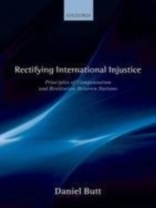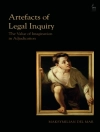The history of international relations is characterized by widespread injustice. What implications does this have for those living in the present? Many writers have dismissed the moral urgency of rectificatory justice in a domestic context, as a result of their forward-looking accounts of distributive justice. Rectifying International Injustice argues that historical international injustice raises a series of distinct theoretical problems, as a result of the popularity of backward-looking accounts of distributive justice in an international context. It lays out three morally relevant forms of connection with the past, based in ideas of benefit, entitlement and responsibility. Those living in the present may have obligations to pay compensation to those in other states insofar as they are benefiting, and others are suffering, as a result of the effects of historic injustice. They may be in possession of property which does not rightly belong to them, but to which others have inherited entitlements. Finally, they may be members of political communities which bear collective responsibility for an ongoing failure to rectify historic injustice. Rectifying International Injustice considers each of these three linkages with the past in detail. It examines the complicated relationship between rectificatory justice and distributive justice, and argues that many of those who resist cosmopolitan demands for the global redistribution of resources have failed to appreciate the extent to which past wrongdoing undermines the legitimacy of contemporary resource holdings.
Daniel Butt
Rectifying International Injustice [PDF ebook]
Rectifying International Injustice [PDF ebook]
¡Compre este libro electrónico y obtenga 1 más GRATIS!
Formato PDF ● Páginas 227 ● ISBN 9780191551154 ● Editorial Oxford University Press ● Publicado 2008 ● Descargable 3 veces ● Divisa EUR ● ID 8543087 ● Protección de copia Adobe DRM
Requiere lector de ebook con capacidad DRM












